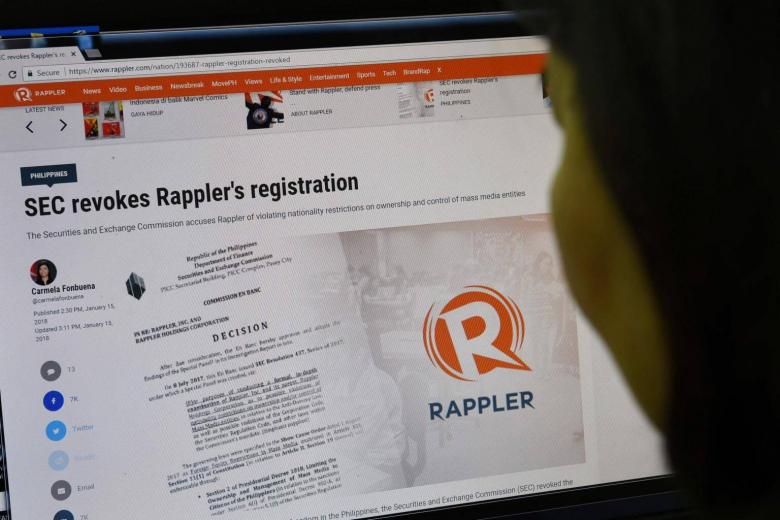MANILA (PHILIPPINE DAILY INQUIRER/ASIA NEWS NETWORK) - If you squint hard enough, you can pretend that the little you see in front of you is the most important thing to see. If you do it long enough, you can even convince yourself that the little you do see is all there is to see in the world.
This sleight of sight explains the decision of the Securities and Exchange Commission (SEC), when it ruled that Rappler, the social media network, had violated constitutional restrictions on foreign ownership of media entities and revoked its certificate of incorporation.
If this revocation stands, Rappler will effectively be shut down - the first time a news organisation will be closed by government action since the dictator Ferdinand Marcos declared martial law in 1972.
Congratulations to SEC Chair Tessie Herbosa and the three commissioners who signed the death warrant! You prove what we can call the Becket corollary: When Henry II aired his dismay against his former friend - "Who will rid me of this meddlesome priest?" - four knights killed Archbishop Thomas Becket of Canterbury on his behalf. But (here's the corollary): To kill a Becket, you need both the assassins and a whole cast of assistants (clerks, stable boys, armorers, and so on) who equip the knights and feed their horses and see them off. These assistants may insist on their innocence, and their consciences may even be clear, but their DNA is on those assassins' swords.
Some readers might remember that, despite my own personal ties to several Rappler journalists, I have written two columns they found hurtful. One was about proof of the confirmation bias of an online-only reporter; the other was about Rappler's mistake in not heeding the vote of its peers on the issue of the livestreaming of the 2016 presidential debates. (I still maintain that it was a mistake, even after the Supreme Court sided with Rappler.)
But I value the work that Rappler journalists do - in part because I knew them and their record from before the site was founded in 2011, and in part because I have covered some of the same news events with them (the climate change talks in Paris, the Apec Summit in Manila, the Duterte post-election thanksgiving rally in Davao, and so on) and was impressed with their reporting.
While journalists are naturally competitive and look for exclusive stories even while forced by structure or circumstance to report as a group, recognition of good work does not stop at a newsroom's boundaries.
In the same way that I am impressed by the work of the Inquirer Group's own staff - say, Doris Dumlao's business reporting, Gibbs Cadiz's theater criticism, or Jong Manlapaz's radio coverage of extrajudicial killings - I recognise the value of the war reporting of ABS-CBN's Chiara Zambrano, the clever use of social media by Philstar.com's Camille Diola and Jonathan de Santos, the Malacañang coverage of Rappler's Pia Ranada.
The list is a long one, and it includes many other journalists from many other news organisations.
Journalists are bound by a common love for telling stories that need telling, and for reflecting on these stories and the world they shape.
The asymptotic ideal is summed up in Carl Bernstein's memorable phrase: It is a journalist's job to get "the best obtainable version of the truth."
The SEC decision of Jan. 11, 2018, is an attack on this common responsibility to get at the truth; that is why other journalists from other news organisations are, like many other citizens of our benighted republic, outraged.
If implemented, it will shut down an entire news organisation, and thereby weaken the collective pursuit of the truth, in an era defined by "fake news" and other forms of disinformation.
The decision is based on a reductionist interpretation of a provision in the agreement between Rappler and Omidyar Network, one of three foreign investors in Rappler's Philippine Depositary Receipts.
I believe this reading is wrong; it does not give Omidyar Network partial control of the news organisation, something expressly forbidden by the Constitution. But even if the provision were defective, the constitutional guarantees of a free press must also be taken into account. As lawyer Oliver Reyes has already pointed out, the principle of proportionality must be followed.
The order revoking incorporation is grossly disproportionate. It makes sense only if you pretend that, by squinting really hard, the provision in question negates the other, more fundamental constitutional guarantees. This new blade thrust into press freedom now also carries the SEC's DNA.
The writer is an Associate Editor and an opinion columnist with the Philippine Daily Inquirer, which is a member of The Straits Times media partner Asia News Network, an alliance of 23 news media.

